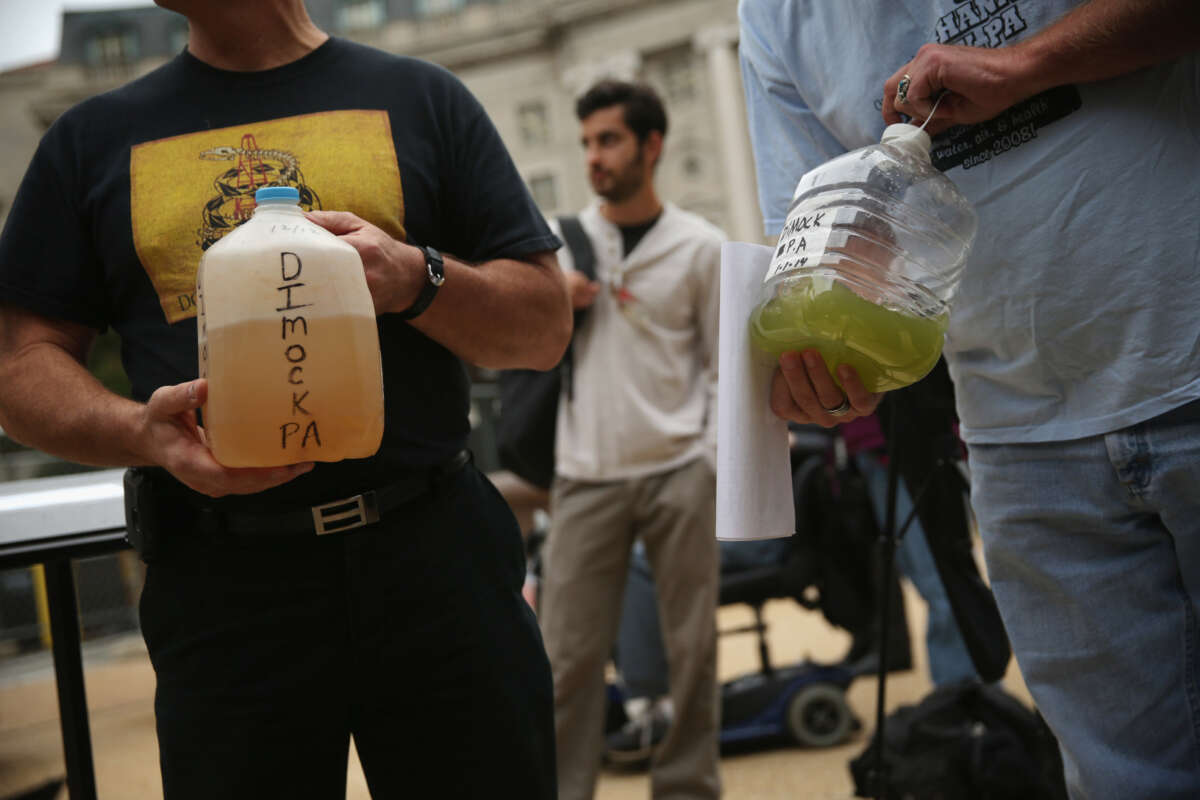Truthout is an indispensable resource for activists, movement leaders and workers everywhere. Please make this work possible with a quick donation.
A fossil fuel company was convicted of criminal charges in Pennsylvania on Wednesday, more than a decade after an early fracking operation poisoned drinking water for residents of the small town of Dimock and sparked one of the first major controversies to arise from the oil and gas boom.
After years of legal wrangling, the company formerly known as Cabot Oil & Gas agreed to plead no contest to 15 criminal violations of state environmental laws and pay nearly $16.3 million for the construction of a new public water supply for Dimock. Activists say some Dimock residents went years without access to clean tap water, and Coterra Energy, the company that bought Cabot, will pay their water bills for 75 years under a plea deal with Pennsylvania Attorney General Josh Shapiro. It remains unclear whether Coterra would be permitted to frack the area in the future, but production was halted years ago as the scandal unfolded.
Located in rural northeastern Pennsylvania, Dimock became ground zero for the debate over fracking on January 1, 2009, when a resident’s water well exploded after filling with methane. Residents had already suffered from strange rashes and headaches for several months, and at least one family was evacuated from their home, according to the environmental group Food & Water Watch. Residents would later learn that a fracking rig run by a Cabot subsidiary had ruptured a “methane pocket” but kept drilling despite a leak.
“Finally, some justice,” said Ray Kemble, a Dimock resident whose water was contaminated, in a statement. “This case proves once and for all that drilling and fracking contaminated our drinking water.”
Back in 2009, fracking was a relatively new technology allowing producers to drill or “frack” horizontally in vast underground shale formations that were rich in oil and gas but largely inaccessible to conventional drilling. The Obama administration embraced fracked natural gas as a “bridge fuel” that would allow the U.S. to reduce coal consumption and meet climate goals, and the industry was engaged in an intense campaign to win over lawmakers and assure the public that fracking is “safe.”
“People across the country remember what happened here in Dimock, and now, they will know the rule of law won the day,” Shapiro said.
However, the plea agreement was 14 years in the making. Shapiro, a Democrat who recently batted off a far right Republican and was elected Pennsylvania’s next governor, brought charges against Coterra Energy in 2020 after a grand jury investigation determined that fracking was to blame for methane and other contaminants in water wells used by residents, who initially signed agreements allowing Cabot to frack under their property.
Shapiro demurred when asked whether Coterra Energy would be permitted to frack near Dimock in the future, saying he would review any proposals with his environmental secretary after taking over as governor. The governor-elect also called for stricter regulation of fossil fuel production.
“If the regulators fail to do that, then industry is not going to be constrained and they’re going to go ahead and put profits before people,” Shapiro said.
Previous investigations by state and federal regulators yielded mixed and highly controversial results. In 2010, the Pennsylvania Department of Environmental Protection (DEP) fined Cabot for contaminating water in 19 homes and drew up plans for an alternate water supply for Dimock. However, in 2012, the DEP allowed Cabot to resume fracking in the area after a pause. Plans to construct a line connecting Dimock to a water treatment facility were dropped by state officials after Cabot agreed to a $4.1 million settlement with 19 families living with contaminated water.
For years, residents relied on bottled water and deliveries of fresh water because they understood that their well water was contaminated. At one point, Cabot was ordered to deliver water to impacted residents, even as the company continued to claim no responsibility for the pollution. On October 19, 2011, DEP told Cabot that the company was no longer required to deliver water to affected families as the dispute over the source of the contamination continued.
In 2012, the federal Environmental Protection Agency (EPA) ran its own tests of drinking water in Dimock, but officials abruptly closed the investigation and declared the water safe to drink with help from special filters — and despite the presence of contaminants associated with fracking. It was later revealed that EPA staff members had warned their superiors that more testing was needed due to the presence of dangerous pollutants.
During the controversy, jugs of brown tap water from Dimock became national symbols of the dangers posed by fracking. In 2014, Kemble and other residents delivered samples of contaminated water to the EPA headquarters in Washington, D.C. For years, Cabot — like the rest of the industry — claimed no wrongdoing as it pressed to expand fracking infrastructure in Pennsylvania and across the nation. Fracking does not contaminate drinking water, the industry claimed. We now know from thousands of peer-reviewed studies in Pennsylvania and beyond that fracking damages the environment and releases air and water pollution that can seriously harm human health.
Holding Trump accountable for his illegal war on Iran
The devastating American and Israeli attacks have killed hundreds of Iranians, and the death toll continues to rise.
As independent media, what we do next matters a lot. It’s up to us to report the truth, demand accountability, and reckon with the consequences of U.S. militarism at this cataclysmic historical moment.
Trump may be an authoritarian, but he is not entirely invulnerable, nor are the elected officials who have given him pass after pass. We cannot let him believe for a second longer that he can get away with something this wildly illegal or recklessly dangerous without accountability.
We ask for your support as we carry out our media resistance to unchecked militarism. Please make a tax-deductible one-time or monthly donation to Truthout.
